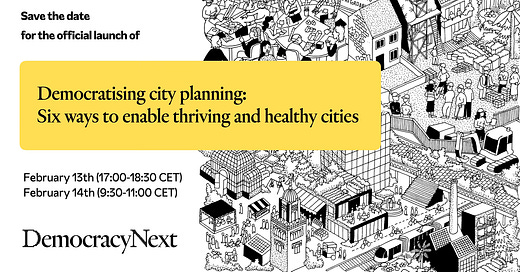🏙️ 6 ways to enable healthy cities
Save the date! Get ready to go deep with us on democratising city planning
Looking for a better way to develop solutions to housing affordability, urban inequalities, climate change, public health, or mobility?
Feeling stuck on how to meaningfully involve citizens in the major decisions affecting their communities?
Given the complex, multi-layered challenges facing us today, we believe that in order to make bolder, more collaborative decisions in our cities, we must involve people in an ongoing, systemic way.
Over the last four decades, cities around the world have increasingly been experimenting with Citizens' Assemblies to address the toughest questions related to the environment, strategic, and urban planning. Given this growing wave, we are proposing that cities go a step further, and tackle these challenges by systematically applying Citizens' Assemblies to urban planning decision making processes in an ongoing manner.
Let’s go deep on democritising city planning. To learn more, save the date!
Register for Tuesday 13 February (8:00-9:30 PST, 11:00-12:30 EST, 17:00-18:30 CET)
Register for Wednesday 14 February (9:30-11:00 CET, 13:30-15:00 IST, 19:30-21:00 AEDT)
In these virtual events, DemocracyNext will share our proposal for how Citizens’ Assemblies can democratise the decisions we take about the future of our cities. The proposal itself is a roughly 50-page report, the result of hundreds of conversations with stakeholders in the field over nearly nine months.
Since spring 2023, we have been working with an International Task Force of 15 multi-disciplinary experts from around the world on a proposal we're calling 'Democratising city planning: Six ways to enable thriving and healthy cities'. We’ve identified the most common problems facing decision makers and the general public when it comes to urban planning, and how these could be addressed by systematically using Citizens’ Assemblies in connection with wider participatory processes.
The proposal outlines several ways we can create a deeper and more inclusive culture of engagement in our cities and serves as a guide for decision makers, planners, developers, and civil society organisations to reimagine how people can play a crucial role in urban planning.
The capstone of this process will be the publication of this work on our website, including translations into Spanish, and French, and an 'Open Application' for cities to apply to partner with us, to contextualise, and implement the ideas outlined in the proposal. — James MacDonald-Nelson
💼 What we’re up to:
Ansel Herz shared his reflections on Taiwan’s elections this past weekend, as a resident of the country
The MIT Student Assembly is taking place on 22-24 Jan — read more about our collaboration on Tech-Enhanced Citizens’ Assemblies
Claudia Chwalisz will be in Oregon from 30 Jan-3 February to meet with local partners and stakeholders to plan the Bend and Deschutes County Citizens’ Assembly - stay tuned for more info!
Claudia will be speaking at the Yale conference on Governing Citizens’ Assemblies and Governing (with) AI organised by our advisor Hélène Landemore on 28 Feb-1 March
The follow-up to recommendations from the Citizens’ Assemblies on Democratising Museums in Bonn and Dresden takes place next month
🤓 What we’re reading:
Marlene Engelhorn, heiress to a pharmaceutical fortune in Austria, launched a randomly-selected Citizens’ Council to decide how to spend 25 million €. We need more democracy in the economy, so bravo, Ms. Engelhorn!
A fascinating RadicalxChange and Dark Matter Labs paper on decentralised civics: “What if, instead of a centralized Environmental Water Quality Information platform hosted by the government, this duty was transferred to each river, each with its own River Civic Data Trust?”
In the UK, former Conservative Party Leader William Hague argues in an op-ed for how Citizens' Assemblies can help save democracy
How a small coastal town in the UK is using a Citizens’ Assembly to develop its response to the threat of rising sea levels
Could 2024 be the year nature rights enter the political mainstream?
Four billion people are expected to vote in elections in 2024. Our friend Azeem Azhar asks 8 questions on the horizon this year: on democracy, AI and more
In an interview at The Ink, Harvard scholar Daniel Ziblatt assesses the state of democracy in the United States. He reminds us of a long-running tradition of reforming the Constitution, which lasted until roughly 1970. “We’ve stopped doing that, and [now] reimagining what’s possible is really important."





